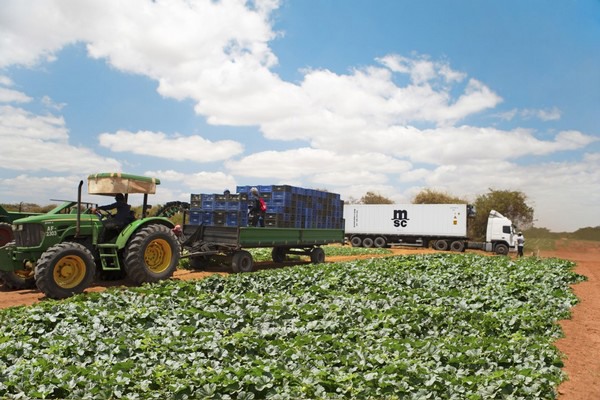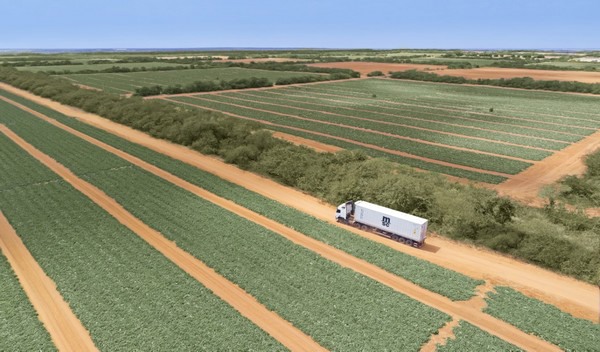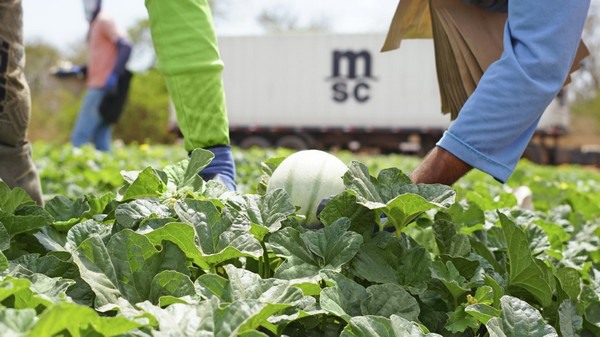“People around the world are increasingly seeking a healthy lifestyle and fresh fruit and vegetables are an important contributor,” says Elber Alves Justo, managing director of MSC Brazil. It is the reason that MSC continues to invest in refrigerated transport solutions for all kind of fruit and vegetables. MSC observes a rise in the demand of fresh fruits being driven particularly by Europe in recent years.
Responding to that the global container shipping company added a shipment call to the Brazilian port of Pecém. “For us at MSC, this port represents a primary gateway for trade between northeast Brazil and the rest of the world, enabling us to have access to faster transit times to key fruit hubs in Europe. We have been exporting perishable cargo from Pecém for over three years now. This very successful partnership was launched precisely with the objective to meet the needs of fruit shippers during peak export season to offer fast transit times to North Europe.”
Transit times increasingly play a role in the transportation of quality fruits. “MSC transit times are adjusted to provide the best solutions for our customers. The solid collaboration that we have developed with the Port of Pecém ensures more efficient and faster processing at port of loading in the North-East of Brazil. It also means we can ensure short transit times to the main European trade hub in the Netherlands, reaching the nerve centre for melon importation in the continent for easy distribution to all key markets in Europe and beyond.”

Seasonal rotation
Not only does Pecém allow for short transit times into Europe, it also ensures proximity to the fruit producing regions of Rio Grande do Norte, responsible for the production of 70 percent on Brazil’s melons, and Ceara. That means that the MSC rotation at Pecém is mainly focused on melons, Brazil’s largest export product, and as a consequence is seasonal.
“We offer high-frequent sailing services from northeast Brazil to the main European trade hubs. Rotation at Pecém starts in the third quarter of 2020 and ends in February 2021, to accommodate seasonal fluctuations.” MSC provides two rotations per week: a trade service to Europe that heads to the northern part of the continent, reaching the Netherlands - Rotterdam in 12 days - and the United Kingdom, while another trade service goes to the Mediterranean reaching Spain - Valencia in 9 days - and Italy, from which point it continues in the direction of the Middle East.

Control procedures
Elber observes that melons are perishable cargo, meaning their transportation requires a high level of care. The global container shipping company mentions that it has developed a solid expertise in transporting perishable cargo and follows highly-standardised control procedures to guarantee optimal transport conditions from pick-up to delivery.
He explains that different melon varieties require different shipping conditions. “Melons are shipped in container reefers ranging from 3° to 10° Celsius, depending on the variety. For instance, the Cantaloupe variety requires cooler shipping temperatures, around 3° Celsius; the Galia variety, is normally shipped at temperatures ranging between 5° and 7° Celsius, and finally both Yellow melons and watermelons can sustain a temperature of 10° Celsius for their transportation.”
Also adding to the careful handling of the perishable fruits is the port’s efficiency. “Pecém is also one of the most secure ports in Brazil, ensuring melons loaded on our container ships can be processed more quickly and efficiently. It is equipped with two exclusive container berths and Optical Character Recognition system, underscoring its high degree of automation, safety, and security for our cargo.”

Customisable
With regard to the current Covid-19 crisis, MSC notices that the situation is clearly affecting local melon producers in Brazil. Estimates are that exports will decrease by 15 to 20 percent compared to last season. However consumption and shipments of fresh produce are expected to continue to grow both in Brazil and globally causing MSC to increase its focus on the reefer transportation of fruit and vegetables.
“We continue to invest in reefer technologies to respond to the booming market for fresh fruit and vegetables, and recent examples have shown just that, as we achieved the first melon shipments from Spain to Asia, the first ever shipment of grapes from Spain to Vietnam, and again high-quality bananas from Ecuador to Asian consumers. We listen to our customers very closely and stand ready to find the best customisable ways to respond to their needs and the ever-changing market shifts,” Elber concludes. (MW)
For more information:
MSC
Tel. +39 338 6568613
patrizia@landofmedia.com
www.msc.com
